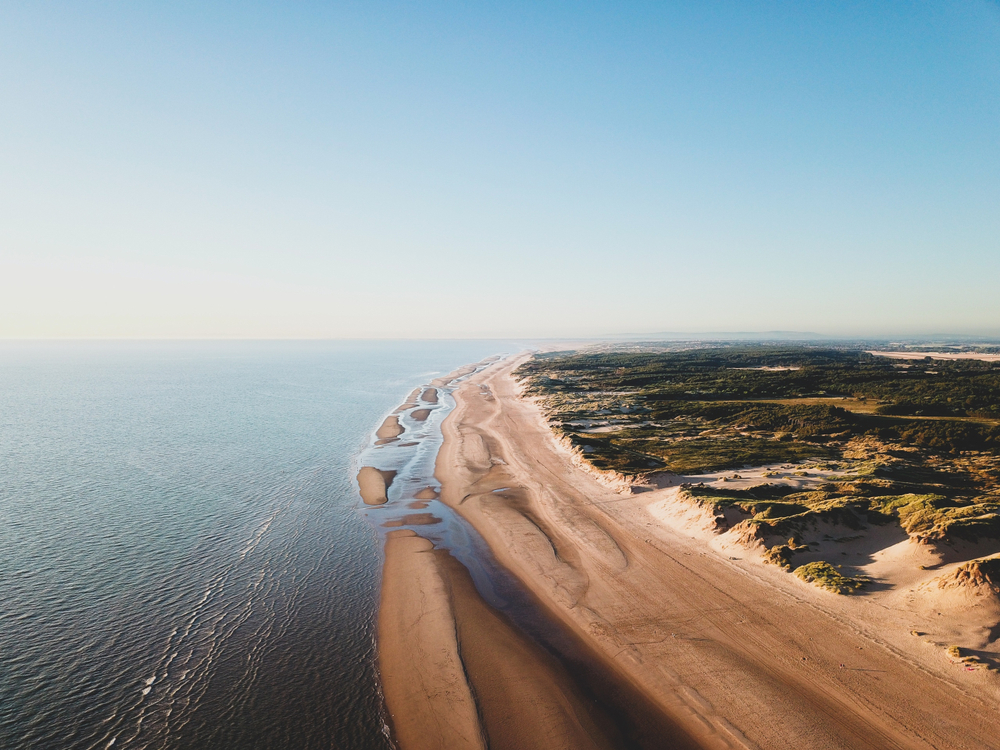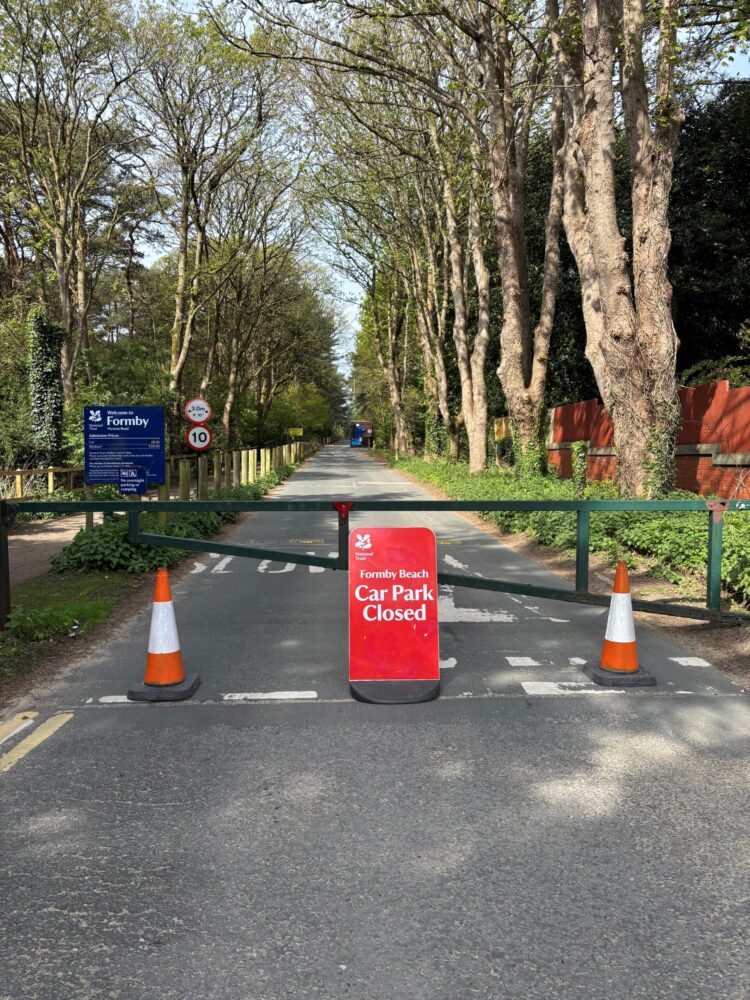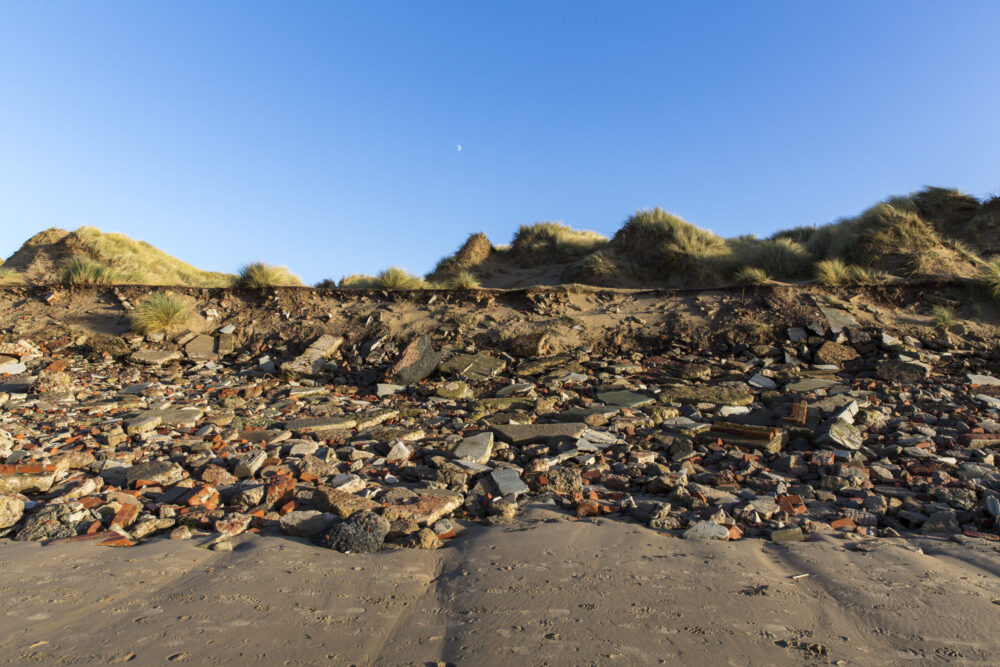
Environment
Major conservation project gets underway, closing Formby Beach car park
10 months ago

The National Trust has launched a major conservation project to restore the natural sand dune habitats at Victoria Road, Formby.
This significant undertaking forms part of the Trust’s long-term commitment to safeguarding this unique area of the Sefton Coast and promises considerable benefits for both people and wildlife.
The project involves the removal of the existing beach car park and large volumes of associated construction rubble. Much of the rubble is being processed onsite and repurposed to create the sub-base for a new, similarly sized, and more sustainable car park, located further inland.
To ensure public safety, large metal fencing will be installed around the worksite, starting at the junction of Victoria Road and Badgers Rake and extending along the car park out onto the beach. Some noise disruption is expected due to the use of heavy machinery.
From 1 May 2025 until spring 2026, there will be no parking, toilets, bins, or visitor access to the beach via Victoria Road. The National Trust’s Lifeboat Road car park and toilets will remain open; however, parking will be extremely limited. Visitors are strongly advised to travel by train to Formby station or consider alternative beaches and car parks along the Sefton and Wirral Coast, particularly on busy, sunny days.
Justin Matthews, Lead Ranger for the National Trust’s Formby and Central Lancashire properties, explained:
“Formby is part of one of the fastest-moving coastlines in the UK. Areas of naturally shifting sand create special habitats for rare sand dune wildlife, including natterjack toads and sand lizards. Sand dunes can also act as a natural sea defence if they’re given the space to shift and change over time. The old construction rubble is creating a barrier and stopping natural sand movement.”
“This conservation project will help us restore Formby’s sand dunes to their natural state and re-connect important habitats, creating space for wildlife to thrive.”
The project also aims to address the long-standing issue of rubble from the demolished Harington Barracks, which was used as the foundation for the beach car park after World War II. Due to the natural movement of Formby’s dynamic coastline, increasing amounts of rubble are being exposed each year, disrupting wildlife habitats and restricting visitor access to the beach.
Relocating the car park not only resolves these environmental concerns but also ensures long-term access for visitors, creating healthier habitats where rare dune wildlife can flourish, and offering a safer, more natural environment for the public.

Rachel Thomas, General Manager for the National Trust’s Formby and Central Lancashire properties, said:
“We understand people will be disappointed to miss out on a trip to Formby this summer, but everyone’s support and understanding is greatly appreciated as we work to enhance this special space for wildlife and people.”
The National Trust continues to work closely with partners along the Sefton Coast to manage visitor challenges during the project. A visitor management plan has been agreed, including diversion route signage for vehicles and pedestrians. The National Trust Formby website and social media channels will be regularly updated with the latest information regarding closures and visitor guidance.
Mark Sopp, Group Manager for Community Safety at Merseyside Fire and Rescue Service, stated:
“We urge everyone to park responsibly to ensure that our firefighters can respond to potentially life-threatening emergency incidents without delay and keep the area safe for all. Additionally, we ask visitors to please take your rubbish home, including cigarettes and glass bottles, and refrain from lighting fires or BBQs, to protect both people and wildlife. If you see a grass fire, report it immediately by calling 999, giving as much detail as possible including the nearest main road. Thank you for your support.”
“We strongly encourage visitors to explore public transport options, or even better, active travel such as cycling or walking to our coastline. Not only are there many wonderful health benefits to active travel, but it is also small changes like this that help our collective efforts to reduce carbon emissions. We understand that local residents may have concerns regarding parking and traffic during this period, that’s why the Council is working closely with Merseyside Police and National Trust to minimise disruption as much as possible.”

Suzanne Grant, Deputy Managing Director and Chief Commercial Officer at Merseyrail, added:
“With regular services every 15 minutes, travelling by train is the most convenient way to visit beaches along the Sefton Coast this summer. We recommend getting off at Formby station, which is in walking distance from the National Trust Lifeboat Road car park. Join us in supporting this important conservation project whilst enjoying a hassle-free journey.”
Cheetham Hill Construction (CHC) has been appointed as the main contractor for the successful delivery of the project, bringing a wealth of experience. They are working alongside expert partners Civic Engineers and Stace LLP. Specialist ecological support is being provided by Tyrer and Simply Ecology to ensure that wildlife at Formby is protected throughout the works.
The dune restoration initiative forms part of a wider programme of conservation work being undertaken through the Dynamic Dunescapes project, funded by the National Lottery Heritage Fund and the EU LIFE Programme. This UK-wide initiative is based on the pioneering principle that dynamic, shifting dunes are healthier for nature than stabilised dunes. The National Trust is also funding a substantial part of this conservation project, supported by its members and visitors.











 Subscribe
Subscribe Follow Us
Follow Us Follow Us
Follow Us Follow Us
Follow Us Follow Us
Follow Us











